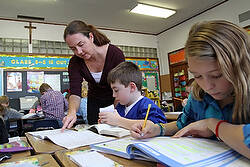Over the last few months, as I've tracked the debates about the Common Core State Standards (CCSS) (which I've written about here), I've become intrigued not just by the wrangling over content but by the way the standards are spoken of or treated. Whether people oppose or support the CCSS, conversations reflect the same assumptions that mark most proposals for education reform. The implicit idea seems to be that if we just had a certain program or idea, some specialized initiative (whether in curriculum, testing, teacher accountability, or budgeting), American education would improve. The adoption or rejection of a particular proposal is seen as decisive. As Rex Tillerson, CEO of Exxon Mobile Corp., wrote recently, “Common Core needs support now more than ever if America is going to reverse its education decline and prepare its young people to compete in today’s dynamic global economy.”
That is a tall order, and a remarkable amount of weight to place on the shoulders of one set of standards.
Education involves not only the content of knowledge, the "stuff" of what is known; it also involves the one doing the knowing, the student. Both elements depend on one another. It's like medicine: a brilliant doctor can offer a roadmap to health, but the patient must be ready to integrate the doctor's advice. It cannot be forced. The same goes for education. The habits of mind and heart the student brings to class, the formation he or she receives at home, the ability of a young man or woman to navigate the temptations and the tempests of pre-adult life: this is all part of the soil in which a skilled curriculum takes root.
At the core of this matter concerns one’s philosophy of education and these questions: Who is, or who should be, considered an educator? What do we count as school, or as curriculum? Teachers and experts today speak of a school almost exclusively in terms of official teachers and formal institutions. But education starts long before that. School begins in the home, in all the acts and behaviors of a mother and father or anyone else who loves a child from infancy into adulthood. In the words of the Second Vatican Council:
Since it is the parents who have given life to their children, on them lies the gravest obligation of educating their family. They must therefore be accepted as primarily and principally responsible for their education. The role of parents in education is of such importance that it is almost impossible to provide an adequate substitute. It is therefore the duty of parents to create a family atmosphere inspired by love and devotion to God and humanity which will promote an integrated, personal and social education of their children.
I am struck by those words: can it be said today that parents embrace that role? In my experience, it's an open question. Some parents absolutely embrace that role; some do not. It doesn't mean they are bad parents or that their children are poorly formed. It just means that they don't consciously seem themselves as responsible for education.
Consider, though, the language of the Church compared to the language of Rex Tillerson (above). What are the consequences for education if we start from the premise that parents are the principal educators? How does this affect the weight we give to guidelines promulgated by experts?
And if we believe that a child's personal formation and family life are decisive, how does that impact what we consider essential for school improvement?
I think of these questions mindful of the words of educational psychologist Madeline Levine. In her book The Price of Privilege, she wrote:
Perhaps the single most important ritual a family can observe is having dinner together. Families who eat together five or more times a week have kids who are significantly less likely to use tobacco, alcohol, or marijuana, have higher grade-point averages, less depressive symptoms, and fewer suicide attempts than families who eat together two or fewer times a week. Eating together reinforces the idea that family members are interested, available, and concerned about each other. It provides a reliable time and place for kids to share accomplishments, challenges, and worries, to check in with parents and siblings, or simply to feel part of the family.
If Levine is correct, our educational policy must reflect these truths. The Common Core Standards might turn out to be wonderful, but that isn't enough. Reversing America's "education decline" depends to a great extent upon reversing the family's decline. There is, then, this surprising but hopeful consequence: As experts try to upgrade schools and prepare students for new jobs, the most radical reform they can encourage might not be the technology of Apple, but the technology of the dinner table. Imagine that: School improvement beginning not with discussions of Calculus or independent clauses, but with this revolutionary question: "How was your day?"








